At a glance
In commemoration of World Health Worker Week, CDC’s Division of Global Health Protection (DGHP) celebrates global health workers – the often-unsung heroes who work tirelessly to protect and promote public health worldwide.
Celebrating our Public Health Heroes
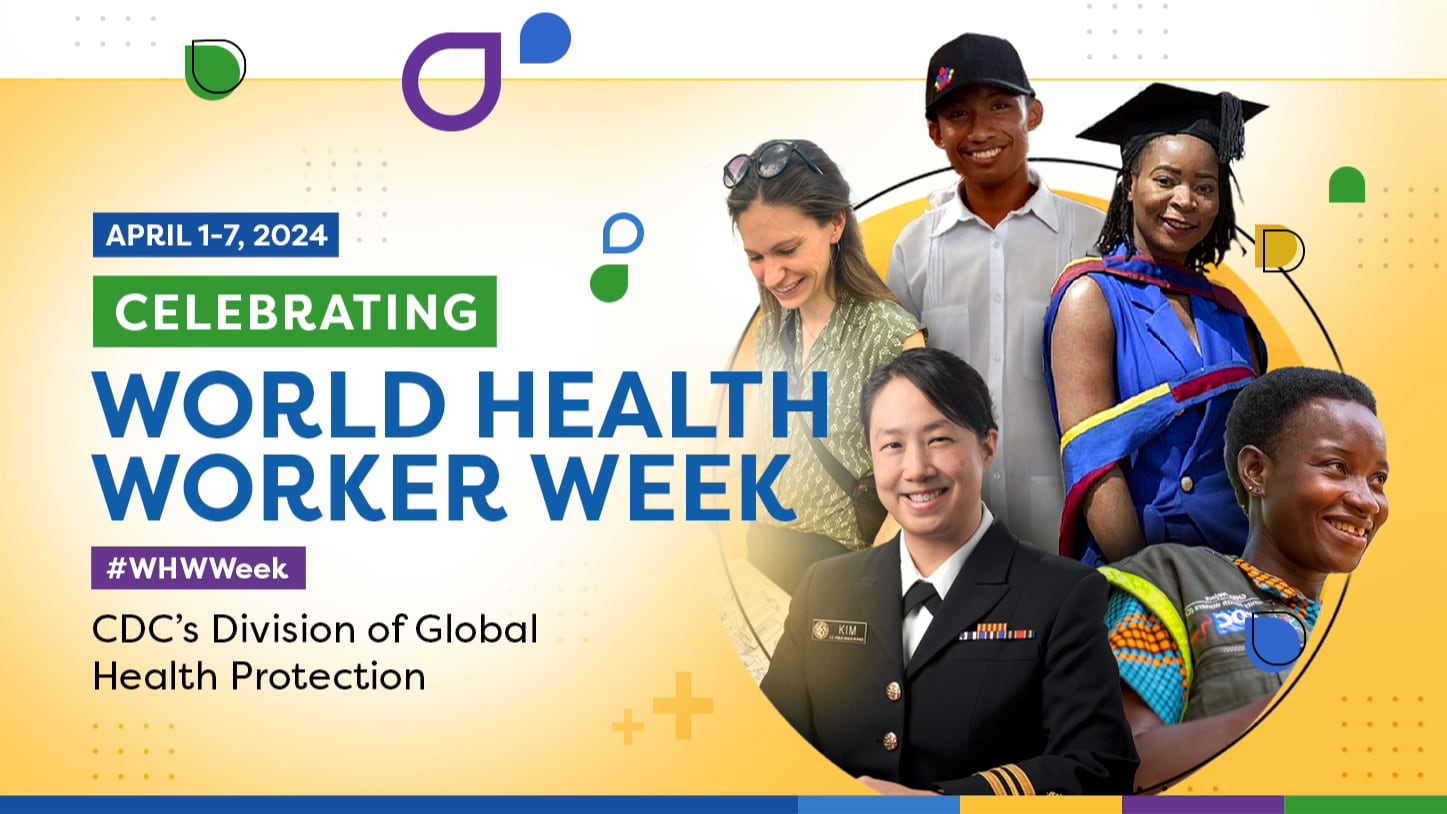
This week, in commemoration of World Health Worker Week 2024, CDC's Division of Global Health Protection (DGHP) celebrates global health workers – the often-unsung heroes who work tirelessly to protect and promote public health worldwide. This year's theme is "Safe and Supported: Investing in Health Workers."
Join us in honoring these inspiring individuals – from outbreak responders to laboratory experts, risk communicators, community health workers, and field epidemiologists – who are making the world a safer place, both abroad and at home.
One Community Health Worker's Heroic Response in Tanzania
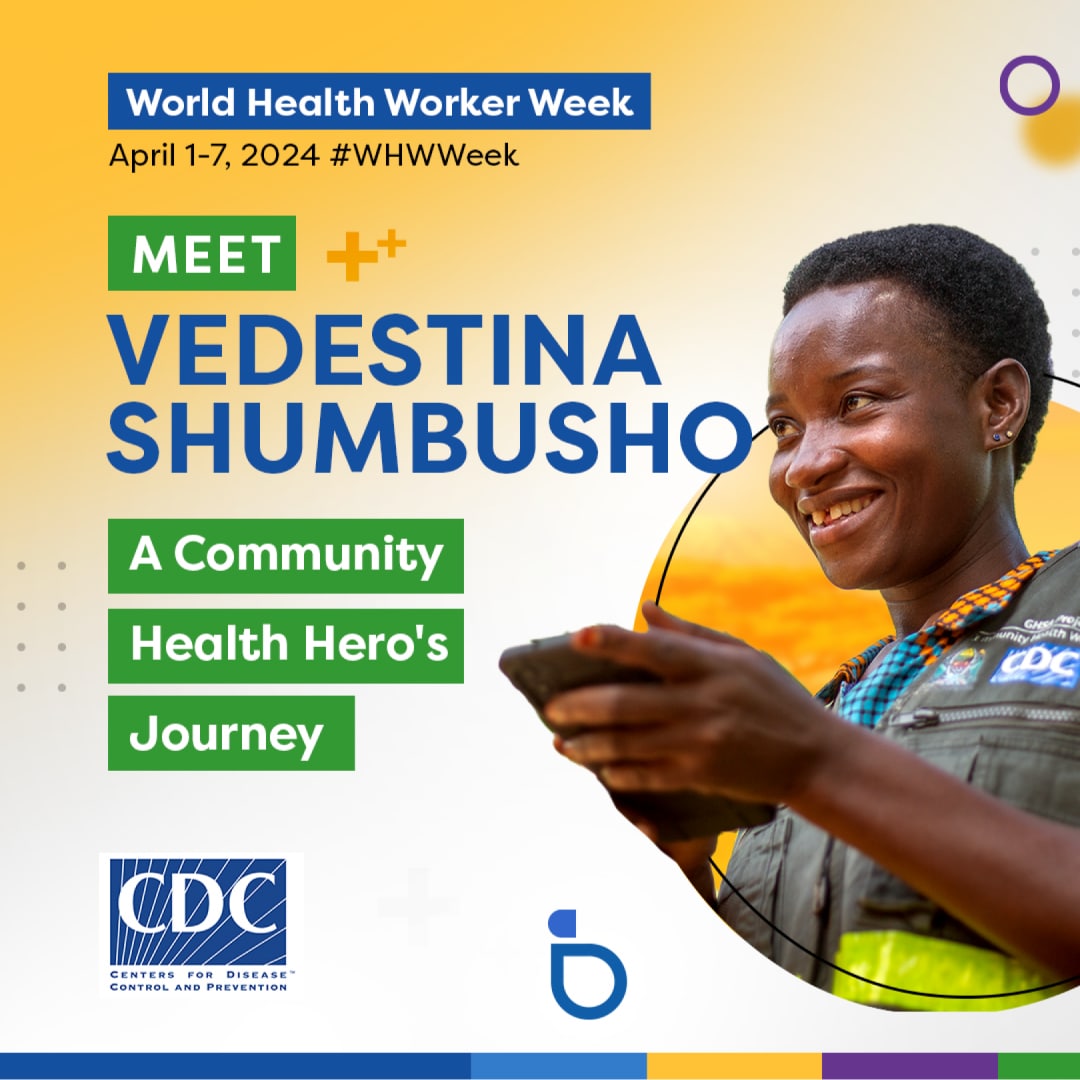
In March 2023, Tanzania faced its first outbreak of Marburg virus disease, a rare and deadly hemorrhagic fever akin to Ebola, in the Kagera region, bordering Uganda and Rwanda. Vedestina Shumbusho, a dedicated Community Health Worker stationed in Kagera, played a pivotal role in containing the crisis. Just a year prior, Shumbusho had undergone training as part of a series of Event-Based Surveillance sessions organized by CDC and its partners in response to the 2022 Ebola outbreak in the region.
When reports of suspicious deaths surfaced in Kanyangereko village on March 15, 2023, Shumbusho sprang into action, using the electronic event-based system (EBS) she had been trained on. Her quick response triggered an equally swift reaction from Tanzanian health authorities, who declared an official outbreak on March 21. This led to a coordinated response by CDC, the Ministry of Health, and other partners who immediately deployed surge staff and provided essential training and assistance on surveillance, contact tracing, and case management.
Thanks to Shumbusho's proactive approach and the collaborative efforts of health authorities, the outbreak was contained, with the last case recorded on May 31 of that year. While the toll stood at eight confirmed cases, one probable case, and six deaths, Shumbusho's early recognition and reporting undoubtedly prevented further spread, saving countless lives.
Advancing Laboratory Capabilities for Global Health Security in Vietnam
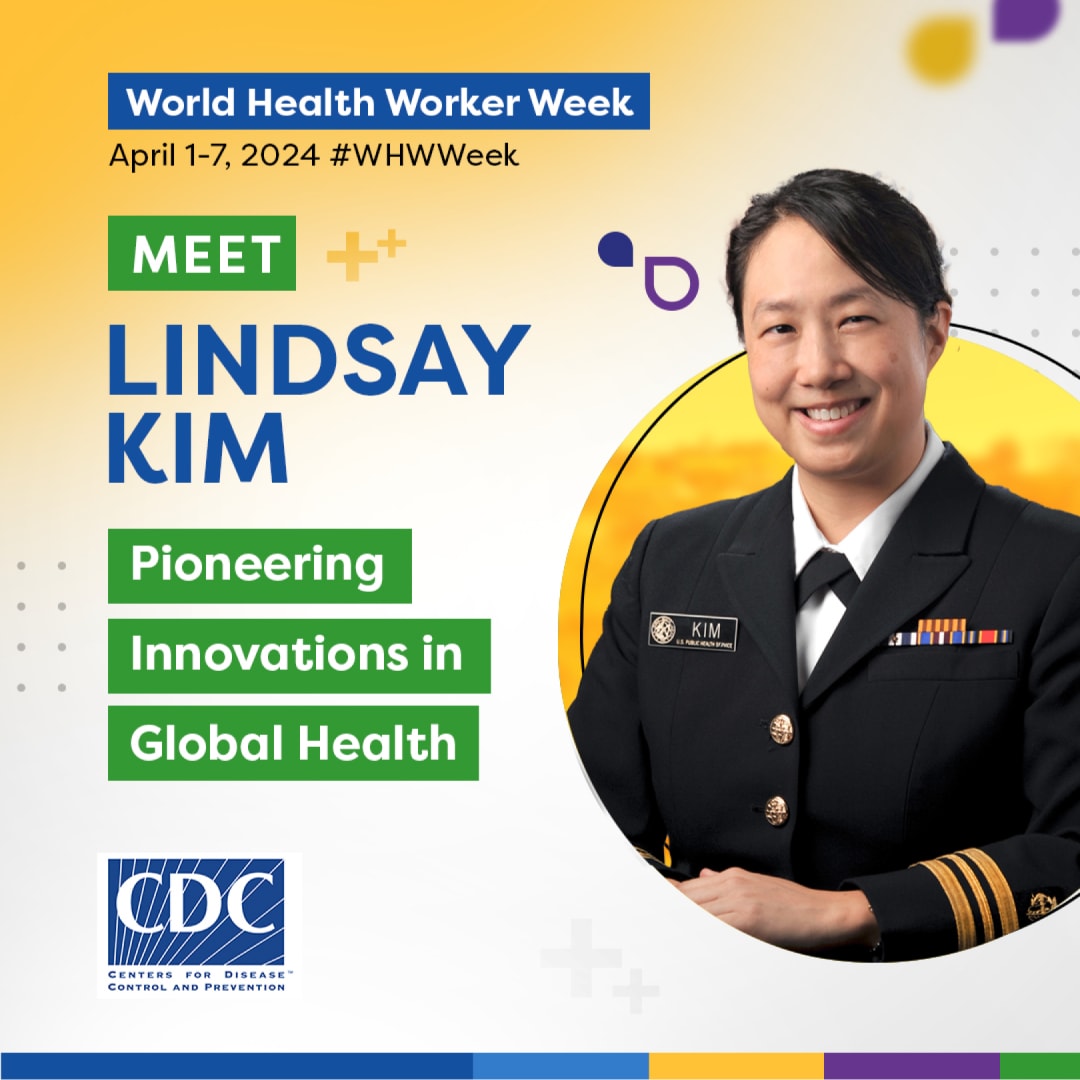
Lindsay Kim, MD, MPH, DGHP Program Director in CDC Vietnam is a physician who traded clinical work in a hospital to make an impact on public health.
As the lead for CDC's global health security efforts in Vietnam, she works side-by-side with the Vietnam Ministry of Health (MOH) to enhance the country's ability to prevent, detect, and respond to infectious disease outbreaks faster.
One critical tool in Vietnam's toolbox is genomic sequencing. The COVID-19 pandemic highlighted the power of genomic sequencing to track emerging variants of the SARS-CoV-2 virus. Vietnam's MOH responded swiftly to the crisis, setting up their own genomic sequencing network with CDC's support.
Working with colleagues across CDC, Kim and the team are building upon this foundation by using the power of genomic sequencing to detect emerging threats, believing it could have a powerful impact in protecting people's health.
In 2023, she and a team of laboratory experts embarked on an innovative pilot. Using existing influenza surveillance in hospitals, they are working to enhance identification of more respiratory viruses using genomic sequencing. In partnership with the Vietnam Administration of Medical Services, Bach Mai Hospital, and the Association of Public Health Laboratories, they procured state-of-the-art equipment to improve the laboratory at Bach Mai Hospital and are training laboratorians to conduct genomic sequencing and analyze data for public health action.
By equipping local experts with skills and resources to harness genetic sequencing for surveillance, Kim and the CDC team are strengthening Vietnam's ability to anticipate threats, take preemptive action, and, ultimately, prevent illness, hospitalizations, and deaths.
Empowering Communities to Combat Cholera in Zambia
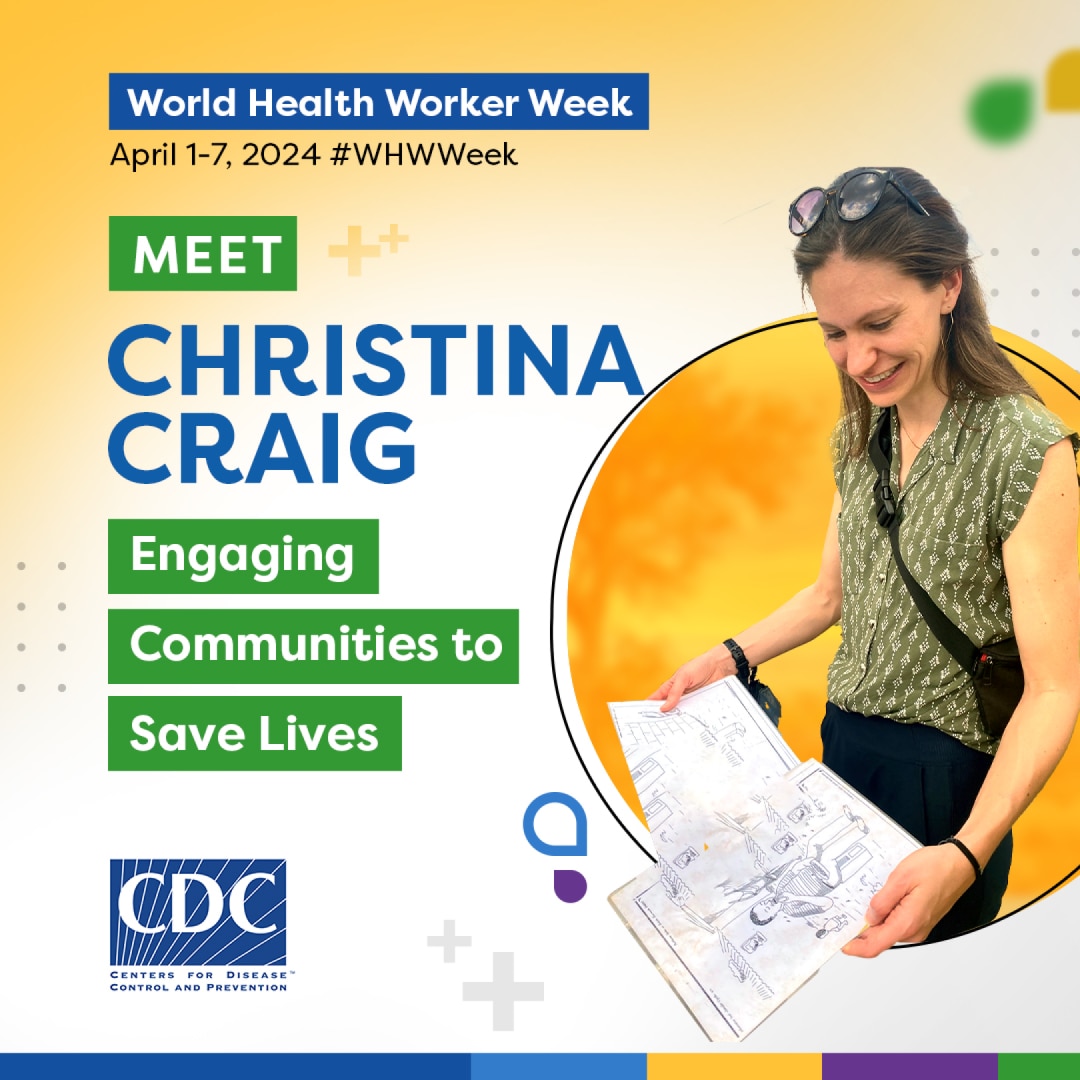
In 2023, during the largest cholera outbreak in Zambia in over 20 years, Christina Craig, a behavioral scientist, joined the CDC team assigned to respond to the country's crisis. Her role was to engage with local communities to explore their experiences with cholera, in order to better understand why the outbreak persisted despite ongoing promotion of preventive measures. Collaborating with the Zambian National Public Health Institute, Ministry of Health, UNICEF, and UKHSA, Craig played a pivotal role in developing tools and training local teams on conducting rapid qualitative assessments to understand what was driving the disease's continued spread.
Following this hands-on training, the team of trained data collectors ventured into densely populated cholera hotspot areas, engaging with the families of cholera victims and survivors.
Listening attentively to the communities, Craig and colleagues shared their findings with public health officials and key stakeholders, who used these findings to inform and improve a range of response activities. Efforts included providing better transportation access to healthcare facilities, introducing a cash transfer program to reduce financial strain on affected communities, and enhancing the quality of care in treatment centers They also used the information to refine health education materials and messages, including simplifying the national key messages for stopping cholera, to the "Three Cs": Clean and safe water. Clean hands. Early Care. This simplified messaging was quickly adopted by response leadership and partner organizations and became a cornerstone of the country's cholera health promotion efforts.
The collaborative efforts in Zambia not only built the capacity of community workers to address such health crises but also helped strengthen knowledge and health security within the country.
Strengthening South Africa's Epidemic Preparedness
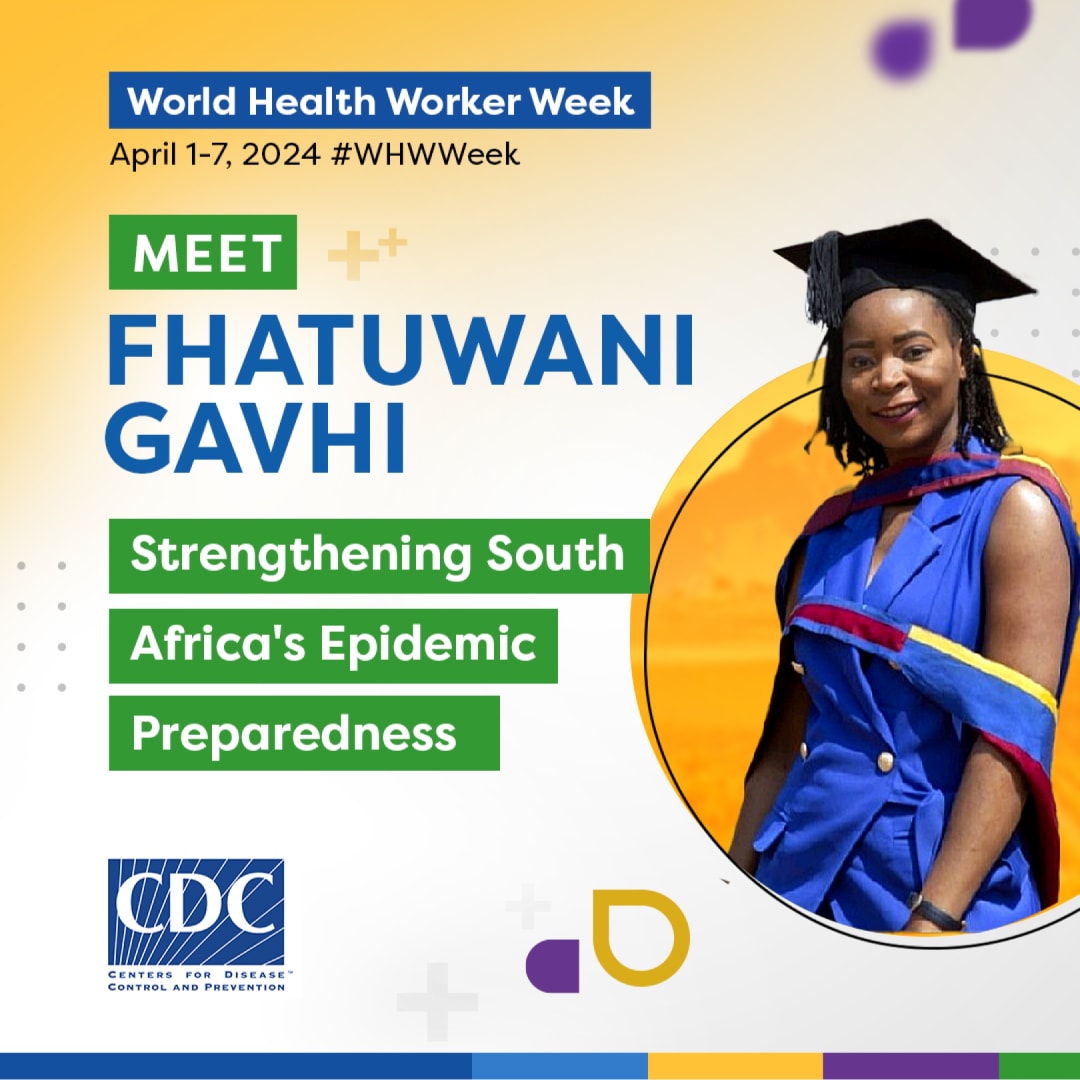
In the midst of the COVID-19 pandemic, CDC-South Africa Epidemiologist in DGHP, Fhatuwani Gavhi, MPH, along with colleagues from the South Africa Field Epidemiology Training Program (SAFETP), recognized an urgent need to strengthen South Africa's outbreak response. In direct response to a Ministry of Health request for more field epidemiologists, Gavhi and colleagues, helped launch South Africa's first Intermediate Field Epidemiology Training Program (FETP).
CDC's FETP program is a global initiative that helps equip local health workers with essential skills to respond to outbreaks effectively. The FETP Intermediate program is the second tier in the FETP model, aimed at further developing participants' field epidemiology skills.
In close collaboration with the South Africa FETP and DGHP's FETP headquarters team, Gavhi worked tirelessly to help establish the Intermediate program. She assisted in crafting its curriculum, helped develop global health and response materials tailored to the country's needs, and supported the launch and implementation of the training's pilot. She also crisscrossed the nation with her SAFETP colleagues, delivering lectures, coordinating training, and mentoring participants through every stage of the process – including supporting the development of related global research.
Today, thanks to the contributions of Gavhi and colleagues, three participant groups have been enrolled from three of South Africa's nine provinces, and planning is underway for expansion nationwide. Her efforts helped strengthen epidemiological capacity in South Africa and are laying the groundwork for long-term sustainability.
A Journey of Commitment and Community in Colombia
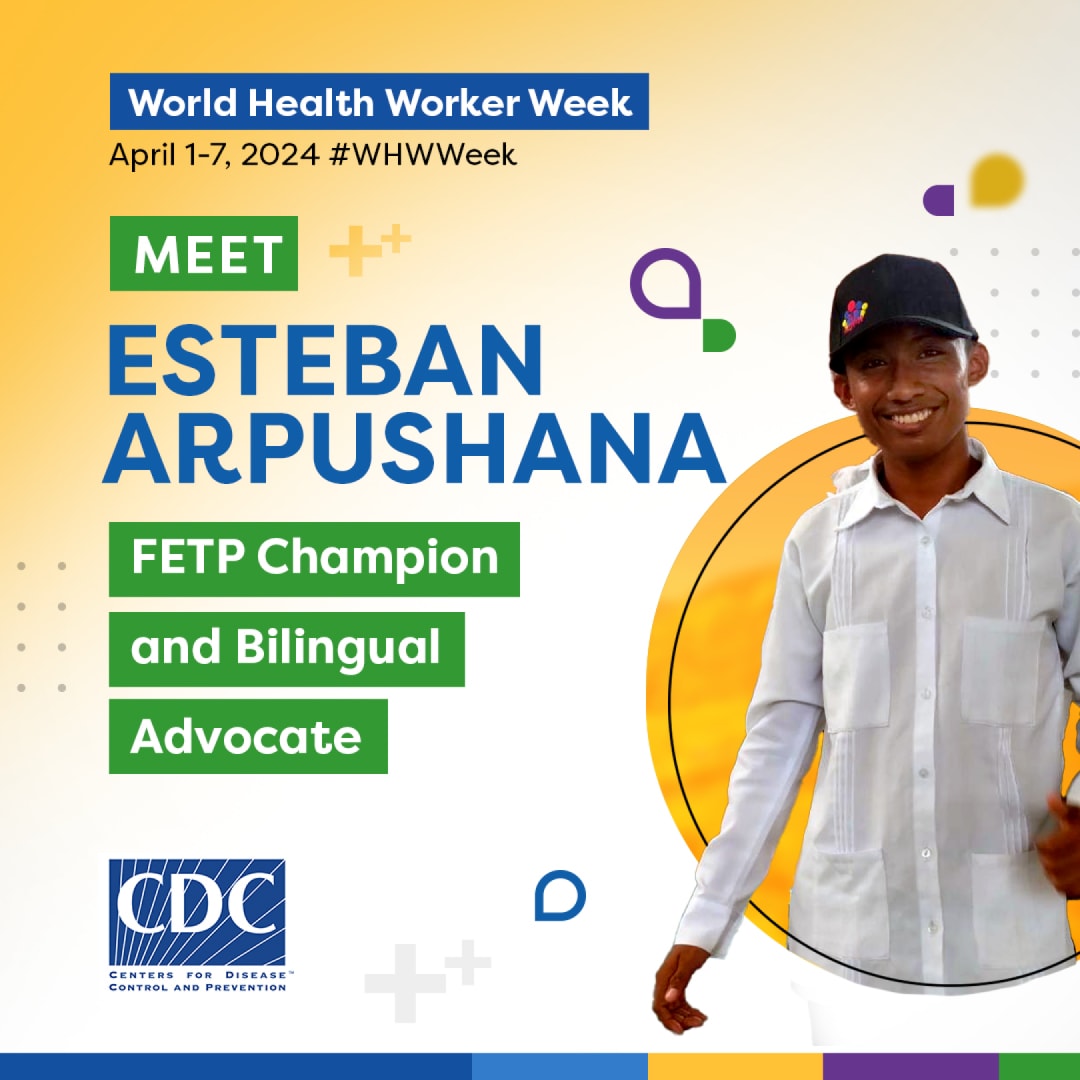
Meet Esteban Zambrano Arpushana, a 19-year-old graduate of CDC's Field Epidemiology Training Program (FETP) Frontline initiative in Colombia and a proud member of the Wayuu community from La Guajira State.
Just two years ago, Arpushana only spoke Wayuunaiki, his native language. However, fueled by his ambition to become a health professional, he pursued a vocational program as a community health worker after high school where he learned to speak Spanish fluently.
When the Colombian National Institute of Health (INS) arrived in his community in the Wayuu Reservation to address critical public health challenges, Arpushana's bilingual skills proved invaluable.
The INS needed assistance in addressing the alarming increase of maternal and child mortality rates, caused by malnutrition and other diseases. Working closely with the Institute, Arpushana helped identify respiratory infections and malnutrition cases among children and pregnant women in his community. He also reported concerning cases to the INS and translated educational materials into his native language.
Leveraging his training from CDC's FETP program, he also spearheaded a community-based control program to eradicate mosquito breeding sites that increase Dengue transmission and designed interventions to tackle malnutrition in his community.
Arpushana's resulting analysis, a scientific publication titled "Dengue outbreaks in 3 municipalities in La Guajira Region" was awarded 1st place in the Best FETP - Frontline investigation category at the 2024 Field Epidemiology Conference in Brazil.
Celebrating Health Workers Worldwide
As we commemorate World Health Worker Week, we commend heroes like Vedestina Shumbusho, Fhatuwani Gavhi, Lindsay Kim, Esteban Arpushana and Christina Craig, and so many other CDC and CDC-supported public health professionals — whose courage and dedication are helping to protect the lives of those in communities around the world and here at home. Their stories stand as a testament to the dedication of public health workers on the frontlines of global health crises and underscore the critical role of CDC's efforts in strengthening health security worldwide.
To learn more about DGHP's efforts to empower a public health workforce to prevent, detect, and respond to disease threats, visit here.
